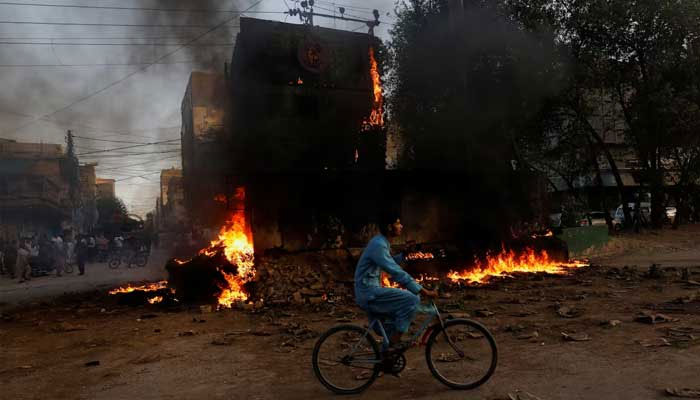EU concerned over sentencing of 25 civilians by military court
Verdicts seen as inconsistent with country's obligations under ICCPR, says EU
ISLAMABAD: The European Union (EU) has expressed serious concerns over the sentencing of 25 civilians by a military court on 21 December.
A statement issued by the EU says these verdicts are seen as inconsistent with the obligations that Pakistan has undertaken under the International Covenant on Civil and Political Rights (ICCPR).
In line with Article 14 of ICCPR, every person is entitled to a fair and public trial in a court that is independent, impartial and competent, and has the right to adequate and effective legal representation. It also stipulates that any judgment rendered in a criminal case shall be made public.
Under the EU’s GSP+, the beneficiary countries, including Pakistan, have voluntarily agreed to effectively implement 27 international core conventions -- including the ICCPR -- in order to continue benefitting from the GSP+ status. Sources said Pakistan had ratified different conventions to comply with for continuation of GSP Plus till 2027 under the transitionary arrangement. Now the EU Parliament is in place and a monitoring mission will be visiting Pakistan during 2025 for holding monitoring to review progress on implementation of ratified conventions agreed by Pakistan.
The EU Parliament is likely to kick-start the legislation process in the next fiscal year 2025-26, so Pakistan will have to undertake a hectic lobbying for securing the next GSP Plus status. This kind of concern expressed by the EU publicly will make it hard for the policymakers to win sympathy for Islamabad to secure the GSP plus status beyond 2027.
Pakistan got $9 to $10 billion exports into the EU markets with the help of GSP plus status, but ironically it remained unable to diversify its exports which remain restricted to only low-end textile products.
-
 Benny Blanco Addresses ‘dirty Feet’ Backlash After Podcast Moment Sparks Online Frenzy
Benny Blanco Addresses ‘dirty Feet’ Backlash After Podcast Moment Sparks Online Frenzy -
 Sarah Ferguson Unusual Trait That Confused Royal Expert
Sarah Ferguson Unusual Trait That Confused Royal Expert -
 Prince William, Kate Middleton Left Sarah Ferguson Feeling 'worthless'
Prince William, Kate Middleton Left Sarah Ferguson Feeling 'worthless' -
 Ben Affleck Focused On 'real Prize,' Stability After Jennifer Garner Speaks About Co Parenting Mechanics
Ben Affleck Focused On 'real Prize,' Stability After Jennifer Garner Speaks About Co Parenting Mechanics -
 Luke Grimes Reveals Hilarious Reason His Baby Can't Stop Laughing At Him
Luke Grimes Reveals Hilarious Reason His Baby Can't Stop Laughing At Him -
 Why Kate Middleton, Prince William Opt For ‘show Stopping Style’
Why Kate Middleton, Prince William Opt For ‘show Stopping Style’ -
 Here's Why Leonardo DiCaprio Will Not Attend This Year's 'Actors Award' Despite Major Nomination
Here's Why Leonardo DiCaprio Will Not Attend This Year's 'Actors Award' Despite Major Nomination -
 Ethan Hawke Reflects On Hollywood Success As Fifth Oscar Nomination Arrives
Ethan Hawke Reflects On Hollywood Success As Fifth Oscar Nomination Arrives -
 Tom Cruise Feeling Down In The Dumps Post A Series Of Failed Romances: Report
Tom Cruise Feeling Down In The Dumps Post A Series Of Failed Romances: Report -
 'The Pitt' Producer Reveals Why He Was Nervous For The New Ep Of Season Two
'The Pitt' Producer Reveals Why He Was Nervous For The New Ep Of Season Two -
 Maggie Gyllenhaal Gets Honest About Being Jealous Of Jake Gyllenhaal
Maggie Gyllenhaal Gets Honest About Being Jealous Of Jake Gyllenhaal -
 'Bridgerton' Star Luke Thompson Gets Honest About Season Five
'Bridgerton' Star Luke Thompson Gets Honest About Season Five -
 Prince William On Verge Of Breakdown Because Of 'disgraced' Andrew
Prince William On Verge Of Breakdown Because Of 'disgraced' Andrew -
 Tig Notaro Reflects On Oscar Nod For 'Come See Me In The Good Light': 'I Was Sleeping'
Tig Notaro Reflects On Oscar Nod For 'Come See Me In The Good Light': 'I Was Sleeping' -
 Kenyon Sadiq Sets 40-yard Dash Record At NFL Scouting Combine, Eyes First Round
Kenyon Sadiq Sets 40-yard Dash Record At NFL Scouting Combine, Eyes First Round -
 Talk Show Host Drops Hint About Taylor Swift, Travis Kelce Wedding Date
Talk Show Host Drops Hint About Taylor Swift, Travis Kelce Wedding Date




